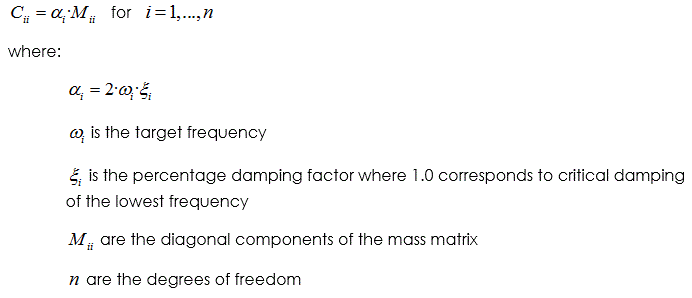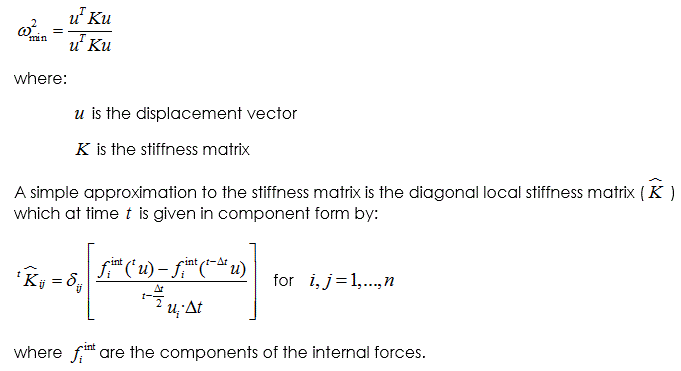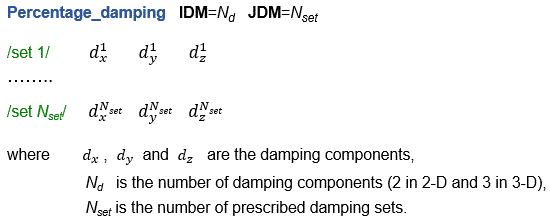Damping_nodal_data
Data Structure: Damping_nodal_data |
|
Description |
"Damping data" data structure for the geomechanical field |
Usage |
Damping_nodal_data NUM=ival where ival is the data structure number |
Description |
Overview The Damping_nodal_data structure defines percentage damping on geometry entities based on an estimated value of the lowest vibration frequency computed using the Rayleigh quotient. It may be applied to the complete problem domain or in specific regions e.g. specific boundaries in a wave propagation problem.
The prescribed percentage of damping is a mass proportional damping defined in the form: C =α*M Or in given the diagonal form of the mass matrix:
The lowest frequency ( Ωmin) of the current deformation mode can be estimated by the Raleigh quotient defined as:
The upper bound of the oscilation frequencies is defined by the critical time step as:
The frequency used in the evaluation of mass proportional damping is the minimum frequency evaluated by the two methods above. This constraint is applied to prevent inappropriate frequencies that may result if the approximation fort Kij is poor (e.g. due to local instabilities). The proportionality constant ( α) is evaluated every time step so that the fluctuating effective stiffness of the system is accounted for. Higher frequencies are damped more strongly than lower frequencies and so diminish first and consequently α tends to a constant value as the quasi-static solution is approached.
Notes •Only one Damping_nodal_data data structure may be specified and re-specification will overwrite the existing data structure •Note that Damping_global_data may be defined to specify default damping values for all the domain which may be locally overwritten by the values specified in Damping_nodal_data assigned to specific materials, groups or geometry entities. •Percentage damping is specified in the range 0 < damp < 1, where 0.1 corresponds to 10% damping of the lowest eigenvalue •Generally percentage damping is specified in the range 0.01 - 0.03 (recommended value 0.02). If larger values of damping are specified they can result in significant over-damping of higher frequencies
Examples demonstrating the usage of Damping_nodal_data include: •damp_2d4n_001a •damp_2d4n_001b •damp_2d4n_001c
|
| Percentage_damping Percentage damping sets (0 < damp < 1) |
Usage |
|||||||||||||||
|
|||||||||||||||
Description |
|||||||||||||||
Defines one or more datasets of percentage damping (0 < damp < 1) which later may be assigned to geometry entities, materials or groups. The data is defined as a series of damping sets in component form; i.e.
|
|||||||||||||||
| Damping_volumes Volume assignment data with damping |
Usage |
|||||||||||||||
|
|||||||||||||||
Description |
|||||||||||||||
Defines the volumes within the problem domain to which damping is applied by assigning a damping set. The data is provided in two rows where: •Row 1 - List of volumes which will be assigned a damping set •Row 2 - Damping set assigned to the volumes specified in row 1
|
|||||||||||||||
| Damping_surfaces Surface assignment data with damping |
Usage |
|||||||||||||||
|
|||||||||||||||
Description |
|||||||||||||||
Defines the surfaces within the problem domain to which damping is applied by assigning a damping set. The data is provided in two rows where: •Row 1 - List of surfaces which will be assigned a damping set •Row 2 - Damping set assigned to the surfaces specified in row 1
|
|||||||||||||||
| Damping_lines Line assignment data with damping |
Usage |
|||||||||||||||
|
|||||||||||||||
Description |
|||||||||||||||
Defines the lines within the problem domain to which damping is applied by assigning a damping set. The data is provided in two rows where: •Row 1 - List of lines which will be assigned a damping set •Row 2 - Damping set assigned to the lines specified in row 1
|
|||||||||||||||
| Damping_points Point assignment data with damping |
Usage |
|||||||||||||||
|
|||||||||||||||
Description |
|||||||||||||||
Defines the points within the problem domain to which damping is applied by assigning a damping set. The data is provided in two rows where: •Row 1 - List of points which will be assigned a damping set •Row 2 - Damping set assigned to the points specified in row 1
|
|||||||||||||||
| Damping_geom_set List of geometry sets with damping assignments |
Usage |
|||||||||||||||
|
|||||||||||||||
Description |
|||||||||||||||
The Damping_geom_set dataset defines a list of geometry set names that are assigned a damping set from Percentage_damping via the Damping_geom_ass keyword.
|
|||||||||||||||
| Damping_geom_ass Damping assignment to geometry sets |
Usage |
|||||||||||||||
|
|||||||||||||||
Description |
|||||||||||||||
The Damping_geom_ass dataset assigns a damping set (by number) to each geometry set specified in the Damping_geom_set keyword.
|
|||||||||||||||
| Damping_groups List of group with damping assignments |
Usage |
|||||||||||||||
|
|||||||||||||||
Description |
|||||||||||||||
The Damping_groups dataset defines a list of group names that are assigned a damping set from Percentage_damping via the Damping_group_ass keyword.
|
|||||||||||||||
| Damping_group_ass Damping assignment to groups |
Usage |
|||||||||||||||
|
|||||||||||||||
Description |
|||||||||||||||
The Damping_group_ass keyword assigns a damping set (by number) to each group specified in the in the Damping_groups keyword.
|
|||||||||||||||
| Damping_materials List of materials with damping assignments |
Usage |
|||||||||||||||
|
|||||||||||||||
Description |
|||||||||||||||
The Damping_materials dataset defines a list of material names that are assigned a damping set from Percentage_damping via the Damping_material_ass keyword.
|
|||||||||||||||
| Damping_material_ass Damping assignment to materials |
Usage |
|||||||||||||||
|
|||||||||||||||
Description |
|||||||||||||||
The Damping_material_ass dataset assigns a damping set (by number) to the each material specified in the Damping_materials keyword.
|
|||||||||||||||




